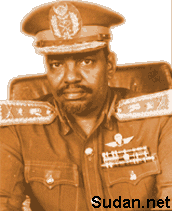 [Arab News] Sudan President Omar Hassan Bashir said on Wednesday the disputed oil-producing Abyei region will remain part of the north after the south secedes in July.
[Arab News] Sudan President Omar Hassan Bashir said on Wednesday the disputed oil-producing Abyei region will remain part of the north after the south secedes in July.Abyei straddles north and south Sudan and both sides have been building up forces there, according to satellite images and the United Nations.
...an international organization whose stated aims of facilitating interational security involve making sure that nobody with live ammo is offended unless it's a civilized country...
South Sudan's draft constitution, to be adopted after the south becomes independent on July 9, lays claim to Abyei, according to a copy seen by Rooters. Bashir rejected the claim.
"Abyei is located in north Sudan and will remain in north Sudan," he told a rally in the province of Southern Kordofan where long-delayed parliamentary and gubernatorial elections start next week.
The audience for his speech, which was televised, was largely from the Arab nomadic Misseriya tribe who lay claim to Abyei, where they graze their cattle a few months a year.
The pro-south Dinka Ngok tribe who reside there all year say Abyei is their territory.
Southern Kordofan, which borders Abyei, contains much of the north's future oil production and Bashir's ruling National Congress Party is fielding Ahmed Haroun as its candidate for governor there in the elections. Haroun is wanted by the
 International Criminal Court
International Criminal Court... where Milosevich died of old age before being convicted ...
for war crimes in Sudan's western Darfur region.
North and south Sudan fought each other for all but a few years since 1955 over differences in ethnicity, ideology, religion and oil. The conflict claimed at least 2 million lives and destabilized much of the region.
Southern Sudanese voted in January to separate from the north and form a new nation, a referendum promised to them as part of a 2005 peace deal which ended the decades of civil war.
An Abyei referendum on whether to joint the north or south was meant to run parallel to the January vote, but it did not take place. Talks on Abyei's future have stalled.

 UNITED NATIONS, April 26 -- Sudan's president has rejected a U.N. appeal to allow its peacekeepers into the Darfur region to help stem a tide of violence that has left more than 100,000 dead and more than 2 million displaced over the past three years, a senior U.N. official told the Security Council on Wednesday.
UNITED NATIONS, April 26 -- Sudan's president has rejected a U.N. appeal to allow its peacekeepers into the Darfur region to help stem a tide of violence that has left more than 100,000 dead and more than 2 million displaced over the past three years, a senior U.N. official told the Security Council on Wednesday.